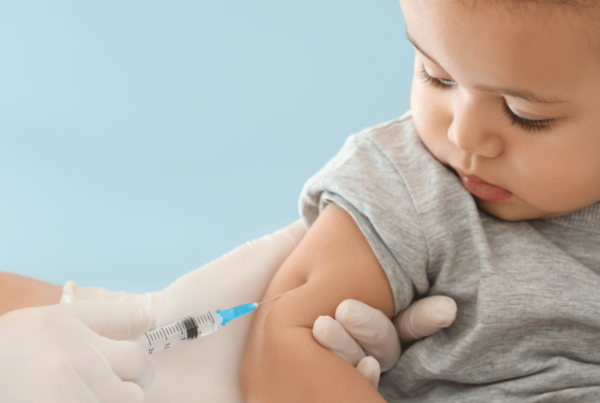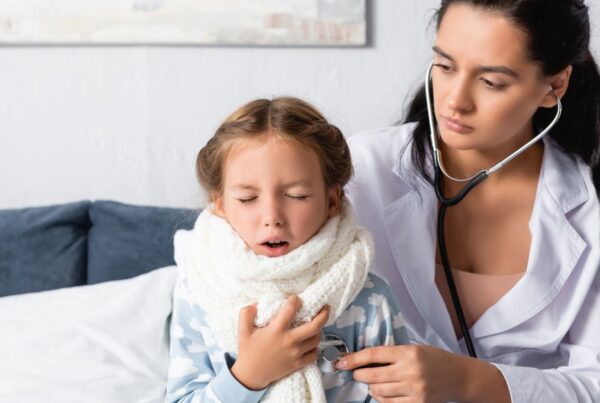Vaccines, like any medical intervention, have an inherent risk of adverse reactions. If you or your child experience concerning symptoms after vaccination, it’s important to know what to do, where to seek help, and how to advocate for proper care and documentation.
In this article, we’ll walk you through the steps to take if you suspect a vaccine injury—including how to recognize potential red flags, navigate the healthcare system, report adverse events, and offer supportive care.
Recognizing Concerning Symptoms of Vaccine Injury
Mild symptoms like low-grade fever, localized swelling, or fatigue are common after many vaccines and typically resolve within a few days (1). However, you need to seek prompt medical attention if you notice:
- High fever (over 104°F)
- Seizures (requires emergency care!)
- Persistent inconsolable crying (especially in infants lasting more than 3 hours)
- Sudden behavioral changes such as lethargy, excessive sleepiness, or unresponsiveness (requires emergency care!)
- Breathing difficulty, facial swelling, or hives (signs of an allergic reaction – requires emergency care!)
- Sudden neurological symptoms such as loss of motor function, slurred speech, or visual disturbances (requires emergency care!)
- Regression of developmental milestones in children
- Severe pain, swelling, or discoloration at the injection site (requires emergency care!)
- Onset of autoimmune-like symptoms (joint pain, rashes, chronic fatigue)
You know your body—and your child—best. If something feels “off,” it’s worth investigating.
If You Suspect Vaccine Injury: Seek Medical Care and Request Documentation
If symptoms of vaccine injury arise, see a trusted healthcare provider as soon as possible. Ask for a thorough evaluation and make sure the visit is well-documented, including:
- The timing and name of the vaccine received
- Onset, duration, and severity of symptoms
- Any relevant medical history or previous reactions
If you feel your concerns are not being taken seriously, don’t hesitate to get a second (or third) opinion or visit an urgent care clinic or emergency room. Keep a personal copy of all medical records and lab results.
If you are looking for doctor recommendations, I have a comprehensive list of Medical Freedom Providers here.

Reporting a Vaccine Reaction
In the United States, vaccine reactions can be reported to the Vaccine Adverse Event Reporting System (VAERS), a national system for monitoring vaccine safety (2).
Anyone can submit a report—including parents, patients, and healthcare providers—at vaers.hhs.gov. When submitting a vaccine injury report, it is important to be as detailed and accurate as possible. Note that submitting a claim to VAERS:
- Does not count as confirmation of a vaccine injury or that the vaccine caused the event
- Does contribute to ongoing safety surveillance and public transparency
- Can be used to support future medical or legal claims
Tracking Vaccine Injury Symptoms and Recovery
If you are concerned that you or your child may have a vaccine injury, I recommend keeping a daily log of any ongoing or new symptoms. Be sure to note changes in behavior, appetite, sleep, development (for children), and physical or neurological health. Videos can be helpful when documenting changes in speech, movement, or awareness.
This information may assist future evaluations and help identify patterns—whether the symptoms improve, worsen, or fluctuate. If you decide to pursue an official diagnosis and/or legal action, this information will help you advocate.
Potential Supportive Therapies for Vaccine Injury
Paperwork and reporting are important but equally so is supporting the health of the injured individual. I recommend getting one-on-one support from an experienced practitioner who is well versed in supporting vaccine injured patients. Some integrative or functional medicine strategies may include:
- Nutrient support, potentially including B vitamins, magnesium, and omega-3s
- Reducing inflammation, through diet, lifestyle, and supplements
- Detoxification support, may include methylated B vitamins, herbal remedies, binders, glutathione, castor oil packs, and more, depending on age and condition.
- Occupational, speech, or developmental therapy, which are best started as soon as possible and can make a big difference in recovery and functional outcomes.
- Homeopathy, craniosacral therapy, acupuncture, or other holistic therapies to help calm the body and promote balance during recovery.

Understand Legal and Compensation Options for Vaccine Injuries
The National Vaccine Injury Compensation Program (VICP) exists to provide financial compensation to individuals found to be injured by certain vaccines. VICP covers both children and adults.
To be eligible, the injury must meet specific criteria, and claims must typically be filed within three years of symptom onset. While not all claims are approved, compensation may cover:
- Medical expenses
- Lost wages
- Pain and suffering
There are attorneys who specialize in vaccine injury cases who can help determine if your case qualifies and help you advocate for yourself or your child.
Should All Vaccines Be Stopped After a Vaccine Reaction?
A suspected vaccine injury often raises the question: Should we stop all vaccines moving forward?
The answer is nuanced and depends on your unique circumstances and preferences. Let me be clear: vaccine reaction or not, if you decide not to continue vaccinating, that is your right as a parent or patient—and you should never be made to feel otherwise.
In some cases—particularly after severe allergic reactions, neurological symptoms, or autoimmune complications—a healthcare provider may advise against further vaccination altogether. In other situations, they may recommend avoiding only the vaccine suspected to have caused the reaction, while continuing with others under close medical supervision and individualized support.
If you have decided to pause or stop vaccinating, it is important to note that medical exemptions can still be difficult to obtain or may be denied, depending on local regulations and the discretion of public health officials. This can place parents in incredibly difficult positions, especially when school attendance is at stake.
To learn more about exemptions, read these articles:
- Medical Exemptions for Vaccines: What Qualifies?
- Covid-19 Vaccine Exemptions
- State Laws & Exemptions
If you are in a state with strict vaccine mandates, it will become even more important to document the injury and ongoing symptoms meticulously and complete all VAERS paperwork. If possible, seek care from a provider familiar with vaccine injury and exemption processes and explore legal support or advocacy groups that specialize in medical freedom
For families who decide to continue vaccinating after a suspected vaccine reaction, it is important to seek out medical guidance from a practitioner that is experienced in vaccine reactions to make sure it is safe. Together, you may wish to explore individualized schedules, and/or strengthen the immune system prior to future doses.
To learn more about supporting your child’s health through vaccination, read these articles: 6 Ways To Support Your Child’s Health On Vaccination Day and Reducing Aluminum Exposure During Vaccination
Summary
If you suspect a vaccine injury, trust your instincts. This can be a scary and overwhelming experience. It is important to seek medical attention quickly, and get additional opinions as needed. Ask questions and request thorough documentation, don’t leave the medical office without documentation in hand, and be sure to report the reaction to VAERS. If symptoms are ongoing, continue to track them, and consider working with an experienced practitioner to support recovery through nutrition, detox, and holistic care. You have the right to pause or stop vaccinating based on what is best for your child.
References:
- CDC. (2024, July 31). Possible Side Effects from Vaccines. Vaccines & Immunizations; CDC. https://www.cdc.gov/vaccines/basics/possible-side-effects.html
- Vaccine Adverse Event Reporting System (VAERS). (2016). Hhs.gov. https://vaers.hhs.gov/


